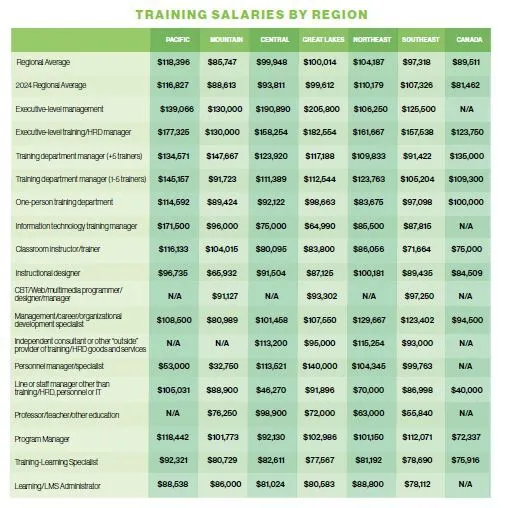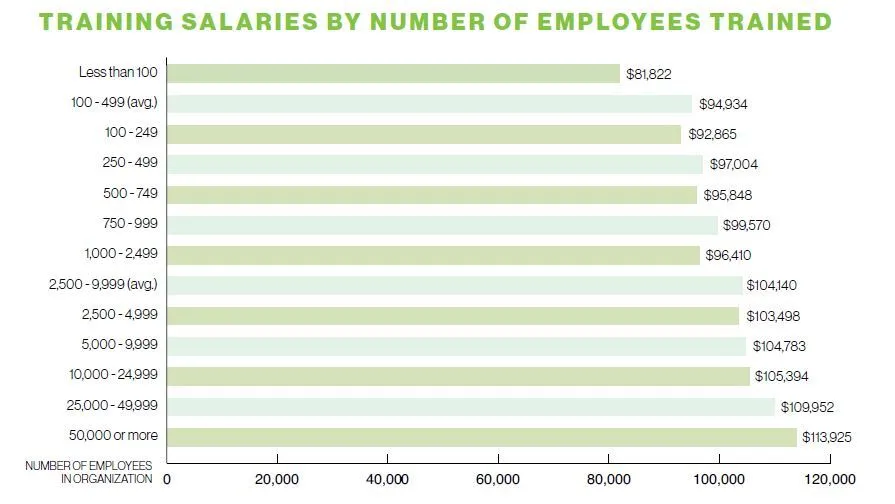To read the full report, visit:
https://pubs.royle.com/publication/?i=856029&p=37
Training salaries dipped 2.2 percent in 2024- 2025 to an average of $99,073, according to Training’s annual Salary Survey of 1,245 Learning and Development (L&D) professionals, which ran from late March to June 2025.
The average increase in salary in the last 12 months (not including a promotion or change of employer) was 3.4 percent, the same as in 2023-2024. The majority (68 percent) of respondents typically work between 40 and 44 hours per week. Some 41 percent of respondents said their salary was low relative to their responsibilities, while 47 percent said it was equitable (vs. 39 and 49 percent, respectively, the prior year). Some 12 percent believe they are well paid relative to their responsibilities (vs. 11 percent last year). Fifty percent of respondents said they received a bonus in 2024, and 54 percent are eligible for one this year. The average cash bonus was $10,469, up slightly from $9,752 the year before.
Organizations also offered a variety of non-cash benefits, the most popular being 401(k) and/or 403(b) plans (74 percent) or other retirement plans (37 percent); flexible work times/telecommuting (62 percent); education reimbursement (43 percent); additional paid days off (33 percent); car/parking/transit incentives (14 percent); merchandise incentives (9 percent); and stock options/stock/equity (9 percent).
BUDGET AND PAY CUTS
Some 38 percent of respondents said their organizations cut budgets in the last 12 months, 2 percent more than in 2023-2024. But only 1 percent of respondents said employers asked them to take a pay cut in 2024-2025, the same as the previous year. Some 8 percent froze salaries vs. 6 percent in 2023-2024. And 7 percent eliminated bonuses, the same as the prior year.
L&D SALARY TRENDS
• Gender Pay Gap: Men earned an average of $105,521, while women earned $96,479, a difference of nearly 9 percent.
• Regional Disparities: The Pacific region led with the highest average salary ($118,396), perhaps influenced by tech-sector hubs. The West Central and Canada regions reported the lowest salaries at $85,747 and $89,511, respectively.
• Job Role Impact: Executive-level positions had the highest compensation, especially HRD managers ($163,264). Instructional designers averaged $86,034, and training specialists averaged $80,213, but educators in academic institutions earned less ($64,405).
• Industry Differences: The highest-paying sectors included real estate/ insurance ($114,501), manufacturing ($112,475), and consulting ($106,853). The education and hospitality sectors fell below average.
• Education and Experience: Salary increases correlated with educational attainment and years of experience:
Doctoral degree: $110,090
Master’s degree: $103,862
13-plus years of experience: $113,127 vs. $76,399 for those with less than three years of experience
• Age-Related Trends: Salaries increased steadily with age:
Under 35: $78,187
50 and over: $107,951
• Organization Size and Scope: Employees at larger companies (10,000-plus employees) earned significantly more, averaging $107,900. Roles with organization-wide training scope earned more ($100,632) than department-limited roles ($85,073).
CAREER CHOICES
Some 76 percent of Training professionals said they wouldn’t choose another career if they could do it all over again (up 3 percent from last year). For those who would have pursued other careers, the top desired fields were in healthcare, tech, and education. Trades and creative careers often were cited as missed passions or more fulfilling options.
To read the full report, visit:





